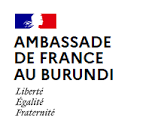Preface
It is with great pleasure that I introduce this volume of stories selected for the first Rumuri Literary Prize in English. Founded under the visionary leadership of Aminadab Havyarimana, then a distinguished student and now our colleague in the Department of English Language and Literature, the Rumuri Literary Prize in English testifies to the growing interest of both readers and writers in Burundian literature in English. The last decade has seen the international publication of original novels in English by Burundian authors, including A Soul for Sale (2007) and Weep Not, Refugee (2014) by Marie-Thérèse Toyi, and There Comes A Time (2009) by Acher Niyonizigiye. Both novelists are graduates of the University's Department of English Language and Literature, where Dr. Toyi, recently returned from West Africa, now shares her expertise as a member of the faculty. One admires the audacity of Toyi and Niyonizigiye in stepping forward to participate in the diverse world of Anglophone literature. Between them, they have invented Burundian literature in English. Their initiative is a gratifying testimony to the English Department's commitment to stimulate not only linguistic understanding but also critical thought and literary imagination.
In addition to the original work of Toyi and Niyonizigiye, English translations of Burundian literature have also begun to appear internationally. In 2015, Zacharie Bukuru's award-winning memoir of the Martyrs of Buta was published in Nairobi by Paulines Africa as We Are All Children of God, and in 2016, Roland Rugero's Baho! became the first Burundian novel to be translated into English, published in the United States by Phoneme Press. Like the novels of Toyi and Niyonizigiye, these works address the cyclical violence of Burundi's recent history, treating the 1993-2004 conflict in particular, with an eye to its antecedents in 1972. Character and setting are primarily rural, depicting ordinary Burundians in local settings. Caught in the tragic arc of civil conflict and its long-term impact, the members of these Burundian communities struggle to meet their basic human needs. (Even the search for a place to relieve himself becomes deadly for Nyamuragi the mute protagonist of Rugero's Baho!). The affirmation (or its opposite) of humanity—the national virtue of ubuntu—is one of the great themes of these works, including the right to education and development, the complex exercise of local justice, and the capacity to love and forgive in the face of violence.
The stories selected for the current volume also explore what it means to be human in Burundian terms. As is often the case in short fiction, most of them frame small communities—a bar, a school, a medical clinic, a household—although Anaclet Ndayikunda's "A Paradise Tree on Earth" gestures toward the national situation through the allegorical conventions of the beast fable. The family is a subject of particular interest. Resilient, tragic, or ironized, the Burundian family emerges as the foundation of the nation in these stories, and the primary indication of its state of health.
Irony is a prominent feature of Clarisse Kaneza's "I Love My Wife," which chronicles the disillusionment of a young waitress named Favor, culminating in her discovery that the boss she idealizes is no more faithful than any of the other husbands who patronize his bar. Like the deceptive solidity of Fidelity Bar itself, "built from gray rock and well-squared stones, ground and fit together perfectly," Favor's boss, Innocent, proves to be nothing but the shadow of the trustworthy family man she had admired. Favor's own innocence is mercilessly eroded over the course of the story. Initially baffled by the sounds emanating from the motel room behind the bar, she becomes adept at imagining the details of "two bodies jumping together" in Room 4. As her imagination is debased, so the language of her internal monologue degenerates, incorporating obscenities and misogynist epithets. She wants to scream them at the top of her lungs, yet finds herself unable to speak. In sharp contrast to her own silent impotence, she witnesses the confidence of her boss's illicit sexual partner as the latter heads for Room 4: "She walked purposefully, her long legs bare, her high heels cracking against the ground." This is what feminine power and agency look like in the ironized world of Fidelity Bar.
Privat Nindorera's story, "The Strength of Love," serves as a moral corrective to the values of Fidelity Bar. In this exemplary romance, a young man remains faithful to his high-school sweetheart against the urging of his age mates, even when his beloved exceeds his level of education by entering university. Just as the infidelity of Kaneza's story was underscored by the refrain of an old song—"Food cooked by another woman tastes good"—so in Nindorera's, the heroine is won over by the young man's improvised love song. There is a truth in songs, in poetry, in the creative word, these stories seem to suggest, a truth that lovers would do well to heed.
Political truths are foregrounded in Anaclet Ndayikunda's "A Paradise Tree on Earth." Here, an idealized society of birds peacefully inhabits one tree, their community undergirded by the poetry, legends, song and stories that are regularly recited in the household and the nation. Resisting the violent attempt of Ravens to colonize them, the birds celebrate their victory in the adoption of a national anthem, "Together We Stand, Divided We Are Powerless." As the birds fall into competition and conflict, they stray from the moral power of their literary heritage, disregarding a parable offered by the peaceful dove who tries to call them back from the madness of destroying the tree they all share. The ensuing slaughter brings no victor, and birds of all sides finally recognize the dove's wisdom. As the nation becomes again "a paradise tree on earth," the birds sing songs of peace to one another and resolve to record them in books so the nation's chicks may learn them in school. The arts—poetry, song, fable, story—emerge as the foundation stones of lasting peace.
Jean Claude Rivuzimana's "They Lived Happily Ever After as Co-Wives" offers a shift in tone from the more earnest social commentary of the first three stories. Its upbeat narrator's curiosity and delight recall the efforts of amateur anthropologists as he relates a case of mutually supportive polygamy in rural Kayanza. "Mr and Mrs MACUMI, farmers from KAYANZA, simply captivated me," he tells us. Later, after explaining to them the treatment of osteo-arthritis in terms of the wear and tear on car tires, he notes that, "I saw the couple absorbed in my metaphor." One could imagine these paragraphs in the diary of a medical missionary or minor colonial official. Whether or not this irony is intentional, Rivuzimana's fictional case study indicates the interest of a younger, professional generation in traditional rural practices that seem almost to emanate from another culture.
The fifth story, Pierre Ndayisenga's "The Importance of a Mother in the Family," offers a darker picture of rural family life marred by drunkenness and domestic violence. Even here, however, the situation can be transformed for good. As the community of neighbors and extended family work to rehabilitate the abusive father and reunite his family, we see the national virtue of ubuntu in action. This is no soft pity, no easy forgiveness, but rather a sturdy refusal to allow any member of the community to waste himself and his human potential. The foundation of this renewal is the long-suffering mother, whose central place in the family underwrites the stability of the whole society.
The imagined communities of these stories depict Burundi as a society upheld or brought down by its intimate relationships. Offering counsel, holding up an ironic mirror, or celebrating exemplary relationships, they affirm the central place of literature in building and guiding the nation. We look forward to more work by these authors and others as they introduce the rich matter of Burundi to Anglophone readers.
Dr. Jodi Mikalachki
Associate Professor of English
University of Burundi
Inrtoduction
The texts published in this compilation were selected from thirty-three short stories submitted to a deliberation panel composed of:... Lire la suite
authors and works
Clarisse KANEZAPrivat NINDORERA
Anaclet NDAYIKUNDA
Jean Claude RIVUZIMANA
Pierre NDAYISENGA
Published collection: Download
 Ambassade de france au Burundi
Ambassade de france au Burundi
 Université du Lac Tanganyika
Université du Lac Tanganyika
 Université de Ngozi
Université de Ngozi
 Université de Mwaro
Université de Mwaro
 Gusoma Edition
Gusoma Edition

